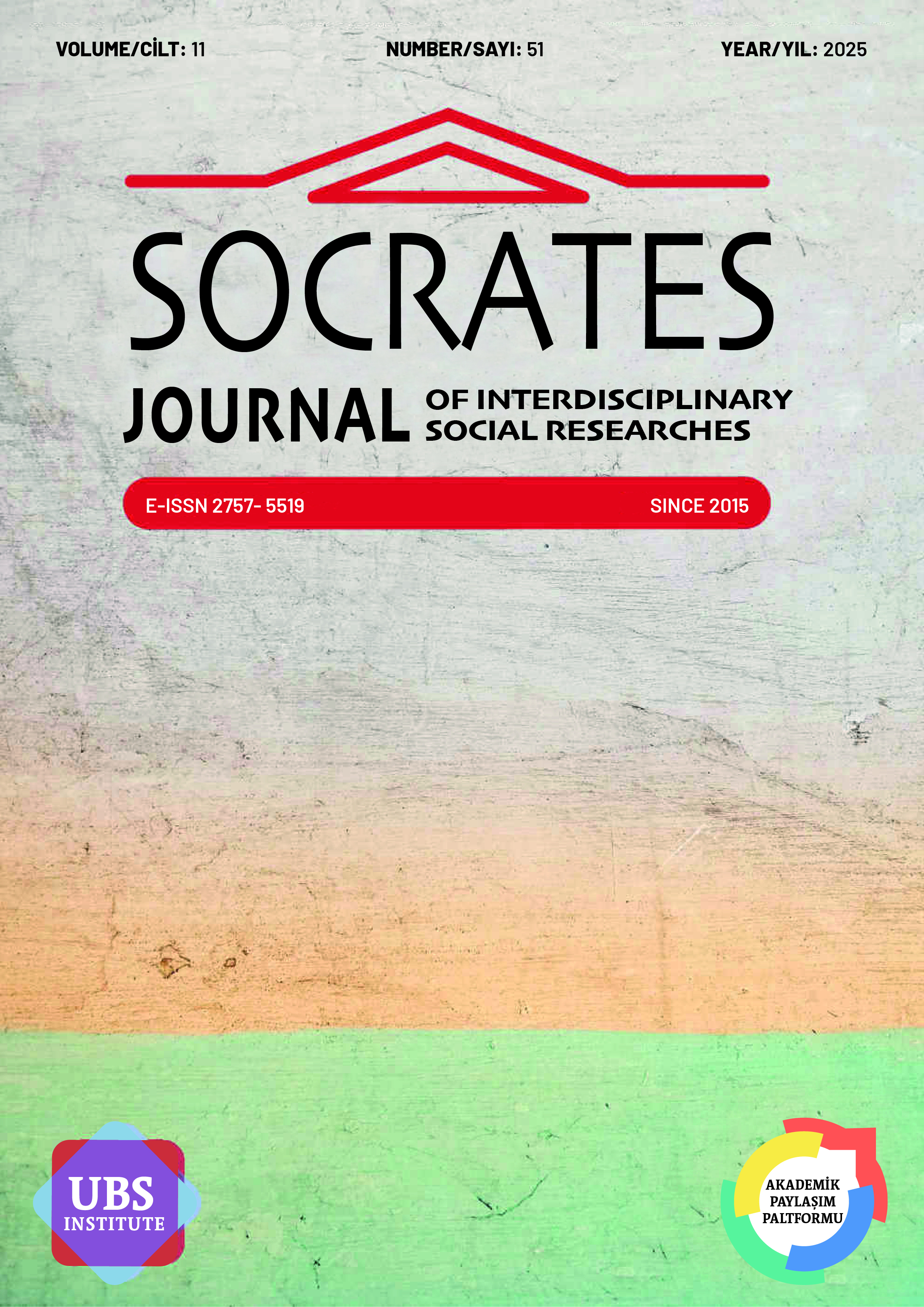ANALYSING THE PERCEPTIONS OF MUNICIPALITY EMPLOYEES TOWARDS IMMIGRANTS IN ISTANBUL ACCORDING TO VARIOUS VARIABLES
İSTANBUL ÖZELİNDE BELEDİYE ÇALIŞANLARININ GÖÇMENLERE YÖNELİK ALGILARININ ÇEŞİTLİ DEĞİŞKENLERE GÖRE İNCELENMESİ
DOI:
https://doi.org/10.5281/zenodo.15064375Keywords:
Migrant, Migrant Perception, Istanbul, MunicipalityAbstract
The study aims to examine the perceptions of municipal employees toward immigrants based on various variables. Additionally, the research intends to investigate whether the perceptions of municipal employees toward immigrants show significant differences according to variables such as gender, educational status, marital status, length of service, and the municipality where they work. In line with these objectives, a survey model, one of the quantitative research designs, was used in the study. Within the scope of the survey model, the population of the research consists of employees working in the Istanbul Metropolitan Municipality and district municipalities in 2024. The research sample comprises 510 individuals selected from the municipal employees in the population using the “Simple Random Sampling” method. To collect data, the “Personal Information Form” and the “Perception of Immigrants Scale” were utilized. Since the data collected through the data collection tools in the study showed a normal distribution, descriptive statistical methods such as arithmetic mean and standard deviation were used, along with parametric inferential statistical methods like the Independent Samples t-Test and ANOVA for analysis. The study concluded that municipal employees have a high level of perception toward immigrants. Additionally, it was determined that the perceptions of municipal employees toward immigrants show significant differences based on variables such as gender, educational status, marital status, length of service, and the municipality where they work.
References
Abadan-Unat, N. (2017). Bitmeyen göç: Konuk işçilikten ulus-ötesi yurttaşlığa (3. baskı). Bilgi Üniversitesi Yayınları.
Aksoy, Z. (2012). Uluslararası göç ve kültürlerarası iletişim. Uluslararası Sosyal Araştırmalar Dergisi, 5(20), 292-303.
Arrocha, W. (2019). Combating xenophobia and hate through compassionate migration: the present struggle of irregular migrants escaping fear and extreme poverty. Crime, Law and Social Change, 71, 245-260.
Bauman, Z. (2021). Kapımızdaki yabancılar (E.Barca Çev.), Ayrıntı Yayınları.
Bhuyan, R., Osazuwa, S., Schmidt, C., Kwon, I., Rundle, A., & Park, Y. (2024). Canadian social workers’ attitudes toward immigrants with different legal statuses in canada. Journal of Social Work, 24(4), 571-596. https://doi.org/10.1177/14680173241240942
Biçer, Z., Kurtoğlu, M. ve Ustaoğlu, S. (2023). Kayseri̇’deki̇ beledi̇ye sosyal tesi̇sleri̇ne yöneli̇k mi̇mari̇ değerlendi̇rme. Erciyes Akademi, 37(3), 1391-1417. https://doi.org/10.48070/erciyesakademi.1274402
Castles, S., & Miller, M. J., (2008). Göçler çağı modern dünyada uluslararası göç hareketleri (B. U. Bal ve İ. Akbulut Çev.), İstanbul Bilgi Üniversitesi Yayınları. (Orijinal yayın tarihi: 1993).
Cohen, J. (2019). Göçmen dövizlerinin etkileri ve göç: Kuramsal önermeler ve fırsatlar. Göç Dergi̇si̇, 6(2), 119-150. https://doi.org/10.33182/gd.v6i2.663
Çakar, Ö. ve Esen, A. (2023). Yerel yönetimlerde stratejik planlama uygulamalarının kurum performansına etkisi. Business and Management Studies an International Journal, 11(3), 1010-1025. https://doi.org/10.15295/bmij.v11i3.2282
Davis, L., & Deole, S. S. (2017). Immigration and the rise of far-right parties in Europe. ifo DICE Report, 15(4), 10-15.
Enoksen, E. (2016). Perceived discrimination against immigrants in the workplace. Equality Diversity and Inclusion an International Journal, 35(2), 66-80. https://doi.org/10.1108/edi-07-2015-0058
Esses, V., Brochu, P., & Dickson, K. (2011). Economic costs, economic benefits, and attitudes toward immigrants and immigration. Analyses of Social Issues and Public Policy, 12(1), 133-137. https://doi.org/10.1111/j.1530-2415.2011.01269.x
George, D., & Mallery, M. (2010). SPSS for windows step bysstep: A simple guide and reference. Pearson.
Ghasemi, A., & Zahediasl, S. (2012). Normality tests for statistical analysis: A guide for non-statisticians. International Journal of Endocrinology and Metabolism, 10(2), 486-489.
Gök, G. O. (2016). Kimin güvenliği? Uluslararası göç-güvenlik ilişkisi ve uluslararası örgütlerin rolü. Kocaeli Üniversitesi Sosyal Bilimler Dergisi, (31), 65-82.
Göker, G.(2013). Göç, kimlik, aidiyet: Kültürlerarası iletişim açısından İsveçli Türkler [Doktora tezi]. Fırat Üniversitesi.
Gürbüz, S. ve Şahin, F. (2017). Sosyal bilimlerde araştırma yöntemleri. Seçkin.
Gürcüoğlu, S. (2020). Türkiye’de siyasi partilerin yerel katılım politikaları. Afyon Kocatepe Üniversitesi Sosyal Bilimler Dergisi, 22(4), 1046-1066. https://doi.org/10.32709/akusosbil.766560
Hainmueller, J., Hiscox, M., & Margalit, Y. (2015). Do concerns about labor market competition shape attitudes toward immigration? New evidence. Journal of International Economics, 97(1), 193-207.
Karasar, N. (2020). Bilimsel araştırma yöntemi: Kavramlar ilkeler teknikler. Nobel Akademik.
Kızıler, N. (2015). Seçilmiş ülkeler kapsamında türkiye deki belediyelerin merkeze bağımlılıklarının analizi. Marmara Üniversitesi Siyasal Bilimler Dergisi, 3(1), 135-164. https://doi.org/10.14782/sbd.2015112082
Mecek, M. ve Atmaca, Y. (2020). Yerel yöneti̇mleri̇n i̇dari̇ yapısına i̇li̇şki̇n mevzuat anali̇zi̇. Elektronik Sosyal Bilimler Dergisi, 19(76), 2068-2087. https://doi.org/10.17755/esosder.735143
Oral, B. ve Fazlılar, T. (2019). Neoliberalizm ve yerel yönetişim bağlamında kamu özel sektör i̇şbirliklerinin yerel girişimcilik üzerine etkileri. Yönetim ve Ekonomi Dergisi, 26(3), 763-782. https://doi.org/10.18657/yonveek.572864
Paredes, C. (2017). Tolerance toward immigrants as a dimension of cosmopolitanism: Explaining attitudes toward immigrants in houston. Sociological Spectrum, 37(3), 149-170. https://doi.org/10.1080/02732173.2017.1299598
Pavel, M., & Pia, S. (2024). Balancing acts: exploring the intersection of cultural understanding and technical support in local government strategies for immigrant micro-financing. International Journal of Arts and Humanities Studies, 4(1), 35-42. https://doi.org/10.32996/ijahs.2024.4.1.6
Tabachnick, B. G., & Fidell, L.S. (2013). Using multivariate statistics (6. edition). Pearson Education.
Tecim, E. ve Karakoyunlu, M. (2021). Göçmen algısı ölçeği geliştirilmesi, geçerliği ve güvenirliği. İnsan ve Toplum Bilimleri Araştırmaları Dergisi, 10(3), 2832-2852. https://doi.org/10.15869/itobiad.957721
UNHCR. (2021). Global trends: forced displacement in 2020. https://www.unhcr.org/statistics/unhcrstats/60b638e37/global-trends-forceddisplacement-2020.html, 13.07.2024.
Yaylagül, C. (2011). Göç sorunu ve yeni göç politikalarının uygulamasında kent konseylerinin birleşimi. www.academia.edu: www.academia.edu, 12.07.2024
Yılmaz-Elmas, F. ve Kaya, A. (2023). Kırsal bölgelerde göçmenlerin i̇şgücü piyasasına katılımı ve yerel ekonomiye etkisi: karacabey örneği. Çalışma ve Toplum, 2(77), 1123-1170. https://doi.org/10.54752/ct.1280832
Zghal, A., El‐Masri, M., McMurphy, S., & Pfaff, K. (2020). Exploring the impact of health care provider cultural competence on new immigrant health-related quality of life: a cross-sectional study of canadian newcomers. Journal of Transcultural Nursing, 32(5), 508-517. https://doi.org/10.1177/1043659620967441
Downloads
Published
How to Cite
Issue
Section
License
Copyright (c) 2025 Socrates Journal of Interdisciplinary Social Studies

This work is licensed under a Creative Commons Attribution 4.0 International License.


